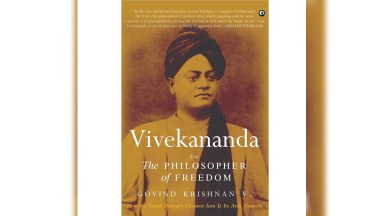‘Absurd that RSS idolises Vivekananda, he was against their take on Hinduism’: Govind Krishnan V
At the launch of his book 'Vivekananda: The Philosopher of Freedom', the writer was speaking on the appropriation of Vivekananda as a right-wing icon and why his legacy disproves it

Last month, at the launch of his new book Vivekananda: The Philosopher of Freedom (Rs 899, Aleph) at India International Centre, journalist Govind Krishnan V said it is “absurd” that the Rashtriya Swayamsevak Sangh (RSS) “idolises” the 19th century philosopher given his speeches and writings on religion.
“The Hinduism preached by Vivekanand negated the importance of everything the Sangh Parivar has latched onto,” he said. “He didn’t agree with how people take a local dietary custom – like not eating cows – and think it’s the essence of the religion itself,” he said, adding that “…his attitude to religion’s role in India, his interpretation of Hinduism, his attitude to the West, and his individualism,” were markedly different from the RSS’s vision. Vivekananda, he said, repeatedly defended Islam in India and abroad.
Krishnan was speaking on a panel that included historian Irfan S Habib, activist Yogendra Yadav and critic NP Ashley.
Referring to Vivekananda’s legacy in India, Habib said that the legacies of many historical Indian leaders have been “abandoned” by academicians and scholars, allowing the RSS to “appropriate” their stories. “Vivekananda’s position on religion, culture and history was contrary to what most right-wing groups say about him today,” he said, adding that “all those who love Vivekananda should actually read him.”
The book also discusses Vivekananda’s 1893 address to the World’s Parliament of Religions, which is not properly known in India, according to Yadav.
He said, “People talk about his appearance in saffron robes and a turban… but what did he actually say [at the address]? He said Hinduism recognises the truth of every religion. Was he a proud Hindu? Of course, he was. Did he believe there was something special in it, more than other religions? There is an ongoing debate… But was he a Hindu supremacist? No.”
Vivekananda’s views on casteism are explored in the book, and, according to Yadav, are similar to Ambedkar’s. But a difference was that Ambedkar found casteism to “flow directly from the essence of Hinduism”, whereas Vivekananda felt Hinduism itself “supplies counter-arguments” to casteism.
Krishnan added, “Ambedkar said Hinduism is casteist. Vivekananda said Hindu society is casteist. But both these thinkers found Hindu society un-democratic. They both believed caste had to disappear for India to be democratic. They both said Brahmins were responsible for the exclusive and discriminatory nature of caste.” He added, “Like Ambedkar, Vivekananda feared that upper caste people would dominate lower caste people… He believed in radical egalitarianism and dismissed the Manu Smriti and Dharma Shastra.”
Ashley commented on how facts around historical figures often get “distorted” in favour of sensationalism, and academia helps us “work with that past.” Lauding the book’s research and motive, he quoted Nietzsche: “the past… should not become the grave-digger of the present.”